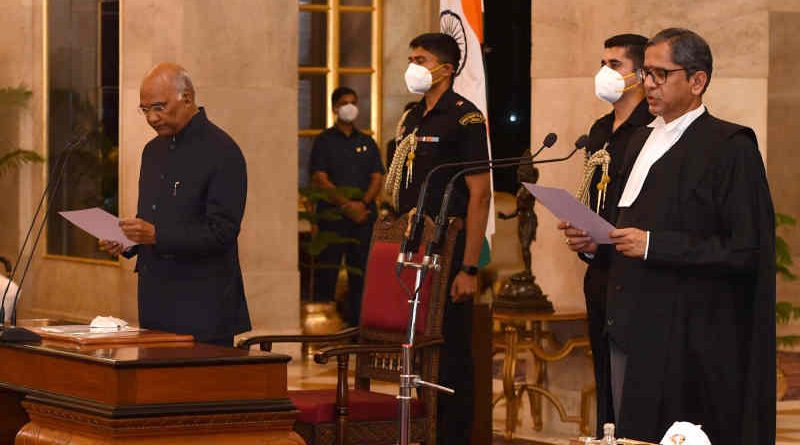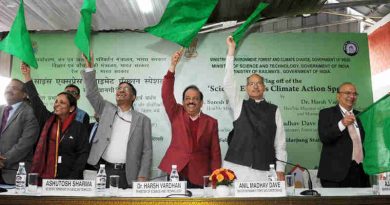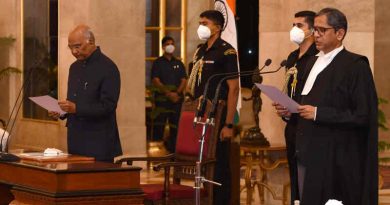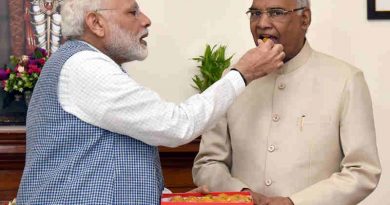Supreme Court Petition to Stop Criminality in Indian Politics
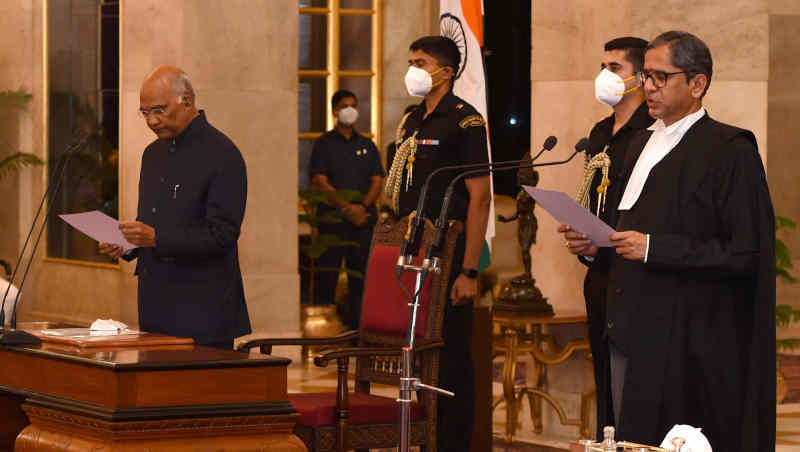
I have sent the following petition with the appeal to stop criminality in Indian politics. This petition is also given below in digital format.
To November 7, 2021
Mr. Ram Nath Kovind
President of India
Rashtrapati Bhavan, New Delhi
Justice N. V. Ramana
Chief Justice of India (CJI)
Supreme Court of India
Tilak Marg, New Delhi 110 001
Petition to Stop Criminality in Indian Politics
Petition by: Rakesh Raman
Dear President and Chief Justice of India,
In his Gettysburg speech of 1863, the-then U.S. President Abraham Lincoln introduced America’s representative democracy as the “government of the people, by the people, for the people.” Ideally, this should be the bedrock for any democracy in the world.
Unfortunately, however, the so-called Indian democratic system has become a “government of the criminals, by the criminals, for the criminals” which does not obey any rule of law. In this system, the ordinary citizens’ role ends immediately after deceptively held elections. Then a handful of criminal politicians run the government as a parliamentary dictatorship.
Now it is being observed that India has become a kakistocracy where the government is under the control of the worst, least qualified, and most unscrupulous people. Their entry, existence, and success in politics is directly proportional to their criminal records and their capacity to commit a range of crimes. You need to be at least a thug, thief, or dacoit to be eligible to become a politician. Alternatively, if you have to survive in Indian politics, you must defend and support the crimes of your bosses in a political party.
In today’s increasingly specialized and cut-throat world, a person must have in-depth knowledge and extensive domain expertise to handle a particular department even in a small company. But it is highly unfortunate that people with no relevant qualification or expertise become Presidents, Governors, Prime Ministers, ministers, judges, and bureaucrats in India to manage highly complex domains of governance. That is why India continues to be a poor, underdeveloped country.
Since politicians are hardcore criminals, the bureaucrats and members of judiciary are scared of them and do not dare to challenge the politicians’ criminal actions which mostly target ordinary citizens of the country. Most bureaucrats and court judges are working as slaves of their political masters. All institutions that are supposed to protect citizens’ rights have become complicit in the crimes being committed by the politicians who run the government. As a result, the fundamental rights of the people of India are constantly under attack.
In the current fateful situation, politicians are criminals or abetters, bureaucrats are highly corrupt and unskilled, police and security forces operate as gangs of goons, and the judiciary is spineless or complicit in state crimes. Therefore, there is no forum for the aggrieved and persecuted citizens where they could go and complain.
Since politicians in all political groups have the same criminal tendencies, the opposition politicians do not forcefully oppose the nefarious acts of those who run the government. The parliament has become an arena for hostile mudslinging where no civil debates are taking place. Actually, the politicians in the government as well as in the so-called opposition parties are part of the same countrywide criminal enterprise that is hell-bent to ruin the country.
Consequently, the people of India are suffering under unprecedented inflation, pollution, hunger, unemployment, government corruption, religious animosity among communities, injustice, and extreme misery. But this frightening trend must stop.
The people of India can be saved only by weeding out criminality from politics. On September 27, 2021, I had sent a related representation (reproduced below) to the Chief Election Commissioner of India to begin the process by bringing transparency to elections in Indian states where Assembly elections are scheduled to take place in 2022. I had urged him to get the criminal records of candidates in Assembly elections released publicly.
Although the Election Commission of India (ECI) registered my complaint and sent me an email acknowledgement on September 27, 2021, it has not taken any action on my complaint. It shows the Chief Election Commissioner’s delinquency and complicity in the crimes of politicians for which he must be suitably punished.
Meanwhile, I urge you that as the President and Chief Justice of India (CJI), you must take some visible and bold steps to stop criminality in Indian politics. These steps may include the following:
Eligibility of Candidates: Specify the eligibility of candidates in elections so that uneducated politicians and those with criminal cases against them should not be able to contest elections. Only those people who have demonstrable public service records should be allowed to participate in elections as contestants.
Disclosure of Crimes: Under its supervision, the Supreme Court should order the construction of an exclusive website on which the details related to the crimes of politicians should be made publicly available. The first step to throw out criminal politicians is to name and shame them openly among the citizens.
Registration of Election Manifestos: The political parties must get their election manifestos registered as legal documents. These manifestos should be treated as service-level agreements (SLAs) between the political party and the voter. If a voter is not satisfied with the service of a legislator or parliamentarian, they should be able to sue them and get them removed from the legislative position during their tenure.
Imposition of Sanctions: If a legislator or parliamentarian fails to fulfill their commitment made to the voters or they are found guilty of a crime or misconduct, they must immediately be removed from their positions. Depending on the nature of crime, the Supreme Court should impose sanctions on criminal politicians including their asset freezing and imprisonment. The Supreme Court must also ensure that such politicians do not enjoy privileged treatment in jails.
Initially, it may be difficult for the Supreme Court to take such courageous steps because the law-enforcement agencies such as police and security forces are controlled by crooked politicians. But soon the Supreme Court will get public support to tame such criminals and weed out criminality from politics.
While I hope for swift action, I will be available for further discussion on this topic of national interest. In order to engage with other stakeholders, I will make this petition document public. Thank You | Rakesh Raman
My letter to the Chief Election Commissioner and contact details are given below.
To September 27, 2021
Mr. Sushil Chandra
Chief Election Commissioner
Election Commission of India (ECI)
Nirvachan Sadan, Ashoka Road
New Delhi 110 001
Petition: Release Criminal Records of Candidates in Assembly Elections
Dear Chief Election Commissioner,
I am a national award-winning journalist and founder of the humanitarian organization RMN Foundation in Delhi. Among other social and editorial projects, I publish The Unrest news magazine that covers economic and political upheavals in the world.
I have also launched the “Punjab Legislative Assembly Election 2022” editorial section under RMN News Service to cover the Punjab Assembly election. It carries news, views, and events related to social, economic, and political developments in Punjab.
Earlier, I have also managed a comprehensive editorial section “Voter Education for Lok Sabha Election 2019 in India” to educate the Indian voters before the 2019 Lok Sabha election.
CRIMINALITY IN INDIAN POLITICS
As you know, the Supreme Court of India – with various judgments and observations – has been trying to check criminality in Indian politics. Unfortunately, however, politics has virtually become a profession for those who are history-sheeters with serious criminal records. Since most politicians in India are uneducated or uncivilized, they lack decency to participate in democratic debates.
Recently, the Chief Justice of India (CJI) NV Ramana remarked that there is a lack of quality debate in Parliament while enacting laws which leads to excessive litigations. His remarks subtly targeted the ineptitude of Indian politicians.
The political situation is equally bad in all the states including Goa, Manipur, Punjab, Uttar Pradesh, Uttarakhand, Himachal Pradesh, and Gujarat where the Assembly elections are scheduled to take place in 2022.
Therefore, going by the observations of the Supreme Court and to stop criminality in politics, you are urged to get the criminal records of candidates in the upcoming Assembly elections released publicly. Ideally, such candidates should not be allowed to contest elections.
BACKGROUND
- India’s leading election research organizations National Election Watch (NEW) and Association for Democratic Reforms (ADR) have analyzed the self-sworn latest affidavits of all 78 ministers (including Prime Minister Narendra Modi) from Lok Sabha 2019, current Rajya Sabha, and assembly elections.
- According to the NEW-ADR report released on July 9, 2021, in a recent cabinet expansion on July 7, 2021, 43 new ministers were inducted in the cabinet. This report focuses on the criminal, financial, and education background details of the ministers in the Modi government. Out of the 78 ministers analyzed, 33 (42%) ministers have declared criminal cases against themselves.
- Earlier, the world’s top magazine The Economist said “a penchant for criminality is an electoral asset in India.” The magazine published data about the political success of India’s “accused murderers, blackmailers, thieves, and kidnappers,” saying that 34% of India’s members of parliament (MPs) in the Lok Sabha have criminal charges filed against them.
- The Supreme Court of India has also said that the political parties must submit the details of such “criminal” candidates to the Election Commission within 72 hours of selecting them, adding that the selection should be based on merit and not the winnability of a candidate.
- The court said its directions shall apply to national as well as assembly elections in states. A bench headed by Justice Rohinton F Nariman noted the alarming rise in the number of candidates with criminal charges entering the fray and decided that the top court should use its extraordinary powers to inform the citizens so they could elect the right candidates.
- The Supreme Court order said categorically that if the political parties failed to furnish the details of the criminality of their candidates or the Election Commission failed to implement the directive, it would amount to contempt of court.
- In September 2018, a 5-judge constitution bench had asked the Central government to immediately enact laws to ban those involved in serious crimes from contesting elections and becoming party officials.
- The court judgment came in response to the contempt petitions against the Central government and the Election Commission, alleging that no serious efforts were made to stop the criminalization of politics despite the court order.
- The Election Commission had said during arguments that the court order to publish criminal details of the candidates was not having any impact and suggested that political parties must be directed not to give election tickets to people with criminal cases.
- The court had earlier ordered that candidates must publish their criminal details in the newspapers thrice after filing their nomination. The petitioner alleged that the Election Commission had not attempted to implement this order effectively.
- As a fallout of crime and corruption in politics, the people in India are suffering under unprecedented inflation, unemployment, pollution, lawlessness, human rights abuses, injustice, and extreme misery. Thus, instead of achieving development, India continues to be an underdeveloped country.
- Now multiple global reports reveal that India is on the verge of losing its status as a democracy. However, criminality in politics is still increasing exponentially, as political parties prefer to accept those candidates who are known for their crimes instead of their intellectual competence.
REQUEST FOR ACTION
In view of the facts stated above, you are requested to issue formal directions to all political parties in different states to publicly release the criminal details of their candidates and they should furnish a valid reason for selecting such candidates.
If the reason is not valid, the candidature of candidates with criminal records should be canceled. This action is required to stop criminality in politics and help voters take informed decisions in the elections.
This is your moral as well as professional responsibility to rescue Indians from criminal politicians who have been ruling the country for the past many decades. Therefore, I urge you to muster courage without getting intimidated to weed out criminality from our political system.
I request you to take immediate action as stated above and inform me accordingly.
ABOUT THE PETITIONER (RAKESH RAMAN)

Rakesh Raman is a national award-winning journalist and founder of the humanitarian organization RMN Foundation. Besides working at senior editorial positions with leading media companies, he was writing an exclusive edit-page column regularly for The Financial Express (a daily business newspaper of The Indian Express Group).
Nowadays, for the past more than 10 years, he has been running his own global news services on multiple news sites covering subjects such as politics, technology, education, and entertainment. He also runs various environment protection, education awareness, and anti-corruption campaigns, and publishes research reports on different subjects.
He runs an exclusive information service on elections and politics in the U.S. and he has launched “Rural Resistance: Protests by Farmers” editorial section to cover the agricultural reforms and ongoing farmers’ protests in India. Recently, he has also started another editorial service to cover Punjab Legislative Assembly Election 2022.
He runs a community-driven anti-corruption social service “Clean House” to help the suffering residents of Delhi raise their voice against the growing corruption and injustice in housing societies where millions of people live. He has also formed an environment protection group called Green Group in Delhi.
He has created a new governance model for various state governments in India to help them introduce “Open Government” in their states by publicly disclosing and updating the personal, performance, financial, and crime details of their MLAs (Members of the Legislative Assembly). He also runs “Catch Your MLA” citizen service for the people of Delhi. It aims to help Delhi citizens hold their MLAs accountable for their dereliction of duty.
He creates and distributes a number of digital publications on different subjects such as coronavirus, environment, agriculture, corruption and transparency, law and justice, and economic and political upheavals in different parts of the world.
He had set up and managed a free school for deserving children for 5 years during 2015-2019 to impart modern education to poor children at the J.J. Colony of Dwarka, Sector 3, New Delhi. Now, after the coronavirus containment, he is again planning to start such schools for poor and disadvantaged children.
He has been facing increasing threats including death threats for his editorial and anti-corruption work. He had also been associated with the United Nations (UN) through the United Nations Industrial Development Organization (UNIDO) as a digital media expert to help businesses use technology for brand marketing and business development. Click here to see his work.
Contact
Rakesh Raman
Editor, RMN News Service [ Website ]
Founder, RMN Foundation [ Website ]
463, DPS Apts., Plot No. 16, Sector 4
Dwarka, Phase I, New Delhi 110 078, India
Mobile: 9810319059 | Contact by Email
This petition is also given below in digital format.

